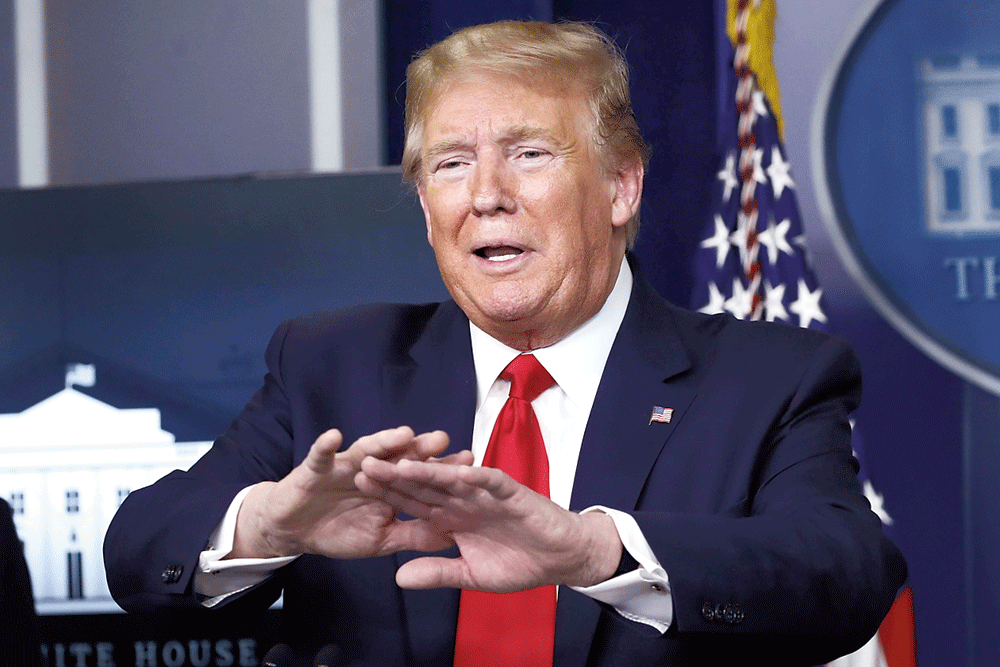Even before the pandemic, President Donald Trump and some of his most hardline advisers had been eager to reduce legal immigration, arguing that Trump’s “America First” campaign pledge should be seen as protecting native-born Americans from having to compete with foreign workers.
On Monday evening, President Trump said he intended to close the US to people trying to immigrate into the country to live and work.
Stephen Miller, the architect of the President’s immigration agenda, has pushed repeatedly for regulations and executive actions that would limit the immigration allowed each year, arguing that immigrants are a drain on American society, drive down wages and take jobs from native-born Americans.
And the President’s restrictionist allies on Capitol Hill quickly praised word of his actions. Senator Tom Cotton, Republican of Arkansas, said on Twitter: “Twenty two million Americans have lost their jobs in the last month because of the China virus. Let’s help them get back to work before we import more foreigners to compete for their jobs.”
Immigrant rights groups angrily dispute the claim that immigration is bad for American workers, pointing to research that shows there is little connection between immigration and wages, and stressing the benefits of America’s immigrant culture. Charanya Krishnaswami, the advocacy director for the Americas at Amnesty International USA, responded to the President’s tweet with one of her own.
“When you’re a xenophobe, bans on migration are the only tired, failed, hateful solution you can think of,” Krishnaswami wrote. “Suspending immigration won’t make the US — which currently leads among Covid cases worldwide — safe. Our policies need to be grounded in public health, not bigotry.”
Trump’s denigration of migrants was the centrepiece of his 2016 presidential campaign, and his assault on the nation’s immigration system was a defining feature of his first term in office.
As he seeks re-election to a second term, Trump has made clear that he intends to energise his supporters by continuing to stoke a fear of immigrants.
In the past several months, Trump has justified sealing the US to migrants by highlighting the risk of spreading the coronavirus, even as his administration has been widely criticised for not taking precautions this year to prevent an outbreak.
At the end of January, Trump blocked some travel from China, citing concerns about the spread of the virus. He later extended travel restrictions to most of Europe.
Trump used authority granted to his surgeon general to immediately turn back migrants and asylum seekers to their home countries, even though the Supreme Court refused to allow a similar policy in 2018.
His administration has leaned into the policy, even rapidly turning away children who cross the border alone.
Weeks later, Trump ordered thestate department to issue visa sanctions against any country that refused to accept an immigrant the administration wanted to deport.
Since taking office, Trump has carried out some consequential immigration policies.
In January, the President expanded his travel restrictions to 13 countries, virtually blocking immigration from Africa’s most populous nation, Nigeria.
That same month, the Supreme Court allowed the administration to move forward with a wealth test that would deny green cards to immigrants who are thought to be likely to make even occasional and minor use of public benefits like Medicaid, food stamps and housing vouchers.
Many advocates have said the so-called public charge rule has discouraged immigrants from seeking medical assistance at a time when the administration’s top health officials are encouraging Americans to be vigilant for symptoms of the virus.
Franita Tolson, who studies constitutional and election law at the University of Southern California, said in an interview that Trump’s latest tweet continues a well-worn pattern of issuing broad mandates against immigrants, often as a base-pleasing political cudgel, only to later rework the orders under mounting legal pressure.
Legally, she said, the administration has a habit of working in reverse: issuing sweeping initiatives, and vetting them afterward.
“He tweets out a broad tweet without details, and the administration tailors it to figure out what might pass judicial review,” Tolson said. She added that Trump’s latest attempt to issue a restrictive order was sure to meet legal challenges.
“Given our infection rate and the lack of testing, he’s taking advantage of a national crisis.”
Reached on Monday evening, multiple White House officials did not offer information on Trump’s plans beyond his tweet.











